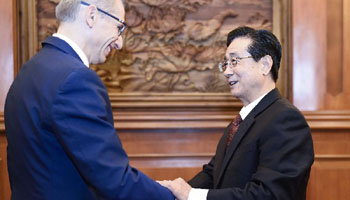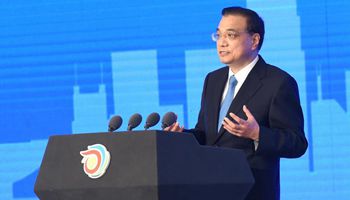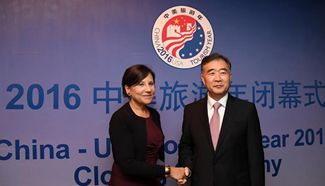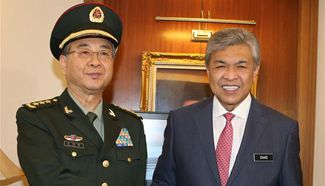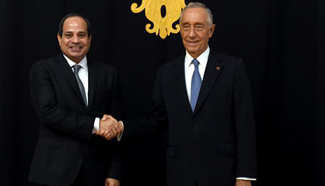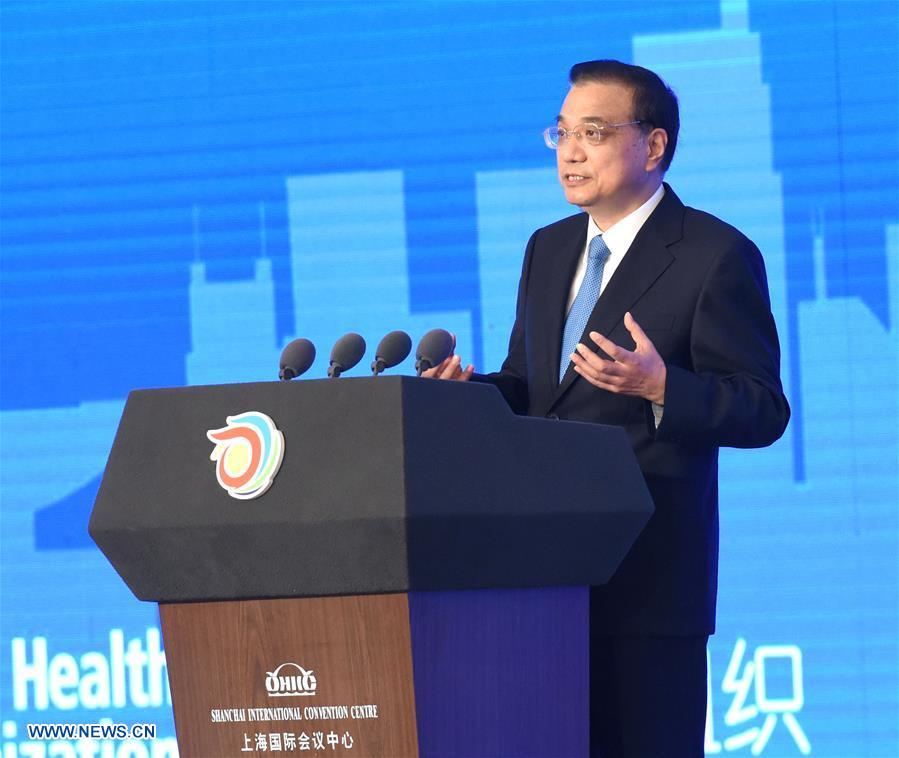
Chinese Premier Li Keqiang addresses the opening ceremony of the Ninth Global Conference on Health Promotion (GCHP) in Shanghai, east China, Nov. 21, 2016. (Xinhua/Rao Aimin)
SHANGHAI, Nov. 21 (Xinhua) -- Premier Li Keqiang on Monday said that China will continue to promote global health issues while providing assistance to other developing countries.
Li made the remarks during a speech in Shanghai at the opening ceremony of the Ninth Global Conference on Health Promotion (GCHP).
China has taken an active role in pushing forward global health, Li said, adding that China will continue to honor its international obligations.
In the past 50 years China has sent 20,000 medical workers to 67 countries and regions, treating more than 260 million patients, Li said.
When Ebola surfaced in West Africa in 2014, China despatched 1,200 medical workers and public health experts to the affected areas, significantly helping to defeat the epidemic, Li said.
On further promoting global health, Li called on all countries to strengthen policy dialogue and set up platforms for medical governance cooperation.
Countries need to create a global public health safety control system, he suggested, adding that they should promote innovation cooperation to increase the ability to face medical challenges.
He also encouraged mutual learning and fusion between traditional medicine and modern medicine.
China's healthcare development path is in line with its national situation, said Li.
China began its most recent round of healthcare reform in 2009, setting the goal of building a basic health care system covering urban and rural residents with universal health care.
The country now has a basic medical care network for 1.3 billion people thanks to years of efforts, in addition to rural and community health care institutions that make access to medical treatment easier.
Currently, the average life expectancy in China is 76.3 years old. The maternal mortality rate has dropped to 20.1 per 100,000, and the infant mortality rate has decreased to 8.1 per 1,000.
This means China's averages beat many middle- and high-income countries, said the premier.
According to the "Healthy China 2030" blueprint, China wants to increase its citizens' average life expectancy to 77.3 by 2020 and 79 by 2030.
"We will forge ahead with the next stage of reform with greater courage and wisdom," he said.
He said changes will be seen across public hospitals, with many administrative barriers broken and better cooperation among hospitals of all levels and types.
China will improve the medical insurance system to cover the whole population, reform the medicine supply system and better motivate medical staff, the premier said.
He also pledged that China will continue to put health and medical care as the priority of development, provide preferential policies and ensure the financial support for health protection.
At the conference, a declaration on promoting health in the sustainable development was published, calling on governments around the world to promise to include the health promotion into their development agenda.
The declaration advocates global coordinated actions in protecting the health rights of women, migrant workers and people suffering environment and human rights crises.
Governments should increase investment in health care, promote the public healthcare system and improve management over non-health products through legislation and taxation, it said.
Prior to the conference, Li met with Director-General of the World Health Organization (WHO) Margrat Chan and leaders of other international organizations including the UN Population Fund, the UN Environmental Protection Agency, the International Telecommunication Union and the Inter-Parliamentary Union.
Chan highly appreciated China's contribution to the global health cause and the efforts and achievements it has made in the process of building "Healthy China."
She said the conference held here in China has an unprecedented scale and will have a far-reaching impact, adding that the WHO is willing to work with China to further promote the global health cause.
On the sideline of the conference, Vice Premier Liu Yandong attended a mayors' forum on establishing "cities of health." She said health should be included in all government policies and more sustainable cities featuring health services should be established.
The people should be allowed to enjoy healthcare services equally and fairly, she said.
Liu also called on global health cooperation to address the cross-border spread of contagious diseases and curb chronic diseases.
The conference was organized by China and the WHO, and is being held in Shanghai from November 21 to 24.
Titled "Promoting health in the Sustainable Development Goals: Health for all and all for health," more than 1,200 representatives including leading politicians from 126 countries and regions as well as 19 international organizations participated in the conference, according to the WHO.
Since the first GCHP in 1986, the conference has become a key platform for the WHO and member states to discuss important global health issues and set the agenda for promoting health worldwide.




